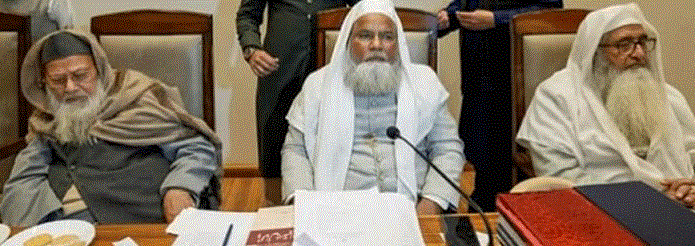Last Updated on February 7, 2023 1:55 am by INDIAN AWAAZ

AMN / Lucknow
The All-India Muslim Personal Law Board (AIMPLB), the apex body on Indian Muslims on Sunday Feb 5 asked to the “highest authorities” to put in place stringent measures to control “hatred being spread” in the country even as it passed resolutions against the implementation of the Uniform Civil Code UCC and razing of people’s properties.
The meeting discussed issues and cases related to Muslim Personal Laws which saw the participation of prominent members, including Ml. Syed Mohd. Rabey Hasni Nadwi, Ml. Arshad Madni, Ml. Fakhruddin Ashraf, Prof. Syed Ali Naqvi, Ml. Khalid Saif Ullah Rahmani, Gen. Secretary, Ml. Asghar Ali Imam Mehdi, Ml. Fazlur Raheem Mujadadi, Ml. Mahmood Madni, Ml. Sajjad Nomani, Ml. Mustafa Rifai Jeelani, Asad Uddin Owaisi, Ml. Khalid Rasheed Farangi Mahli, Ml. Wali Faisal Rahmani, Qasim Rasool Ilyas, Kamal Farooqui, Yusuf Hatim Machala Advocate, Ml. Syed Bilal Hasni Nadwi, Ml. Ateeq Ahmad Bastavi, Shamshad Ahmad Advocate, Tahir Hakeem Advocate, Dr. Monisa Bushra.
Meeting in Lucknow, the board also urged the judiciary to take a serious note of the “injustice” being meted out to the weaker sections and the minorities.
In its appeal to the “highest authorities”, the board urged them to control the spread of hate “before irreparable damage was done to the fabric of our nation’s harmony”.
The board passed several resolutions at the meeting, including against “illegal” appropriation of waqf properties.
“Houses built for decades are getting razed. Those holding peaceful demonstrations are framed under the most stringent of laws and put behind bars indefinitely,” the AIMPLB said in a statement.
“Lawlessness, whether on the part of the citizens or the rulers, is condemnable and all citizens and stakeholders must oppose it strongly,” the board said. The reference appeared to be to the bulldozing of allegedly illegal properties in Uttar Pradesh, actions which critics say target Muslims.
In one such resolution, according to AIMPLB general secretary Khalid Saif Ullah Rahmani, the board said the implementation of the Uniform Civil Code would deprive citizens of the privileges provided to them by the personal laws.
Such a “code is neither relevant nor beneficial for a multi-religious, multicultural and multilingual country like India”, the statement said.
On the Places of Worship (Special Provisions) Act, 1991, the AIMPLB said that failing to implement it could lead to “endless differences among various religious groups”.
“The government must not surrender to the separatist powers and should responsibly safeguard the legal interests of all,” it urged.
On waqf properties, the board said: “It is unlawful for any citizen or government to grab waqf properties. The AIMPLB strongly opposes statements by some public representatives instigating action to deprive Muslims of their waqf properties and appeals to the government to beware of such actions.”
The board advised Muslims to take care of waqf properties and use them, as much as possible, for educational purposes.
The board also called for the following of due procedure of law as it lamented: “Unfortunately, lawlessness is prevailing in the country and an attempt is to implicate the accused even before the prosecution and litigation take their course.”
“Law is a ray of hope for justice. Lawlessness steeps society into anarchy,” it added.
Making an appeal to the judiciary, the AIMPLB statement said: “Judiciary is the last hope for the public. No bigger misfortune can there be than disappointment on this front.”
The board observed that religion and faith are matters of belief and conscience, hence, the decision to follow a religion is natural.
“It is unfair to use force or money to influence an individual in this matter. However, in many states, laws have been made (so) as to deprive citizens of this very basic right. This is totally unacceptable. Yet, those who willingly choose to switch from one religion to another are free to do so,” it said.
